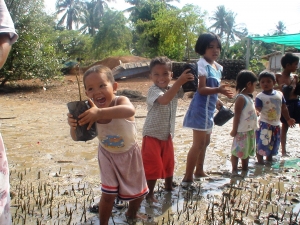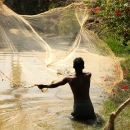Building on Success, Learning from our Shared Experience
Location: Bangkok, Thailand. 11th May 2014
From the beginning, MFF has promoted an integrated approach to coastal management (ICM), recognizing that the health of communities and their livelihoods is directly related to the health of the natural systems they depend on. In all our programme activities, we have focused on three cross-cutting themes: generating and applying knowledge; empowering stakeholders; and promoting integrated and inclusive governance of coastal ecosystems through policy solutions that support ICM practice.
Generating and applying knowledge
Effective coastal management must be based on sound knowledge and understanding of the particular issues defining the community or area to be managed. Ideally everything from ecological, biophysical and socio-economic conditions to knowledge of political and cultural settings and prevailing governance systems should be included in the management considerations.
Unfortunately, coastal managers often don’t have access to the information, knowledge and expertise they need to do their jobs well. MFF is working in a number of ways to strengthen management capacity, and providing a better basis for decision making.
Direct training initiatives include MFF’s Integrated Coastal Management (ICM) post graduate certificate course, which has trained more than 90 coastal management practitioners since it was introduced in 2007, with many of them going on to adapt and translate parts of the course for further dissemination.
MFF has also developed a field-based mangrove restoration and management training course which is providing hands-on, practical experience in restoration techniques. A total of 25 candidates from 11 countries participated in the Regional Training Course on Mangrove Restoration and Management in 2013, and shared scientific knowledge, technical expertise and best practices around mangrove restoration/rehabilitation, conservation management and monitoring.
Read more about MFF’s Integrated Coastal Management Courses.
The generation and application of knowledge within MFF isn’t confined to the classroom, however. The sharing of knowledge and experience is also built into the DNA of the MFF initiative, through the National Coordinating Body structures in each country, and through exchange visits between countries and/or project sites. At the project level, MFF’s small, medium and regional grant projects serve as “living laboratories”, providing opportunities to test new approaches and develop best practices, while also actively promoting capacity building within project structures.
As part of a recent MFF symposium on community resilience, participants from Indonesia and Viet Nam had a field visit to Shyamnagar in Bangladesh to see firsthand the long-term effects of creating polders/dykes to control the flow of fresh water and sediment within the delta system for agriculture and shrimp production. The lessons from Bangladesh were clear: blocking water and sediment flow changes the character and productive potential within the delta with serious implications for local livelihoods. Through this exchange visit the experiences from Bangladesh may influence decisions in Vietnam where the government is currently considering the installation of large-scale dykes along the coast to manage fresh water and exclude marine water.
Active learning and knowledge generation is also increasingly being built into our fundamental project processes. The new resilience approach introduced over the past year provides tools for multi-stakeholder engagement which begins with a situational analysis for a defined coastal area -- the knowledge shared through this process provides a solid basis for project design and selection but is also the starting point for monitoring and evaluation and for capacity development in the communities.
Empowering stakeholders
MFF also seeks to empower stakeholders in coastal communities so that they can have more control over their resources and more influence in decision making, offering them a better chance of enhancing their livelihood opportunities and creating a sustainable future. MFF recognizes that empowerment is most effective when done in a co-management setting in conjunction with established government agencies. In this respect, MFF works strategically with local partners to build the capacity of communities and local government to effectively manage their resources.
Through the grant facilities, MFF has been able to effectively demonstrate a number of successful management models and approaches that empower stakeholders in coastal management decision making processes. For example, a project in Viet Nam introduced a co-management regime in the Xuan Thuy National Park to enable fishing groups that live around the Park to benefit from resources in the core zone of the Park, and engaging them in decision-making processes. Results included a significant increase in incomes and a more sustainable use of resources. The government in Vietnam has recognized the success of the project and the Park authorities are beginning to shift to more inclusive approaches, a clear demonstration of how results from MFF projects contribute to the creation of an enabling policy environment.
Read more case studies about how MFF projects strengthen empowerment.
Promoting good governance and policy solutions
Fundamental to the success of MFF is the promotion of good governance and the development of policy solutions which will support better management of coastal resources. MFF sees good governance of coastal ecosystems as the shared responsibility of national governments and the people who are dependent on the natural resources for their livelihoods. This requires active engagement and partnership among all sectors in addition to support from strong national and local policies. In practice, MFF works at three policy levels: the regional level – by working with key regional actors; the national level – by working through the MFF NCBs to identify and mobilize partnerships that address national priority issues; and at the local level – by implementing projects that promote co-management and ensure equitable access to resources and decision making processes.
At the regional level, MFF brings national representation of governments, NGOs and private sector to the table through the Regional Steering Committee (RSC), where they interact with each other, openly discussing and debating issues and the best ways forward, as well as interacting with key policy influencing bodies, such as FAO and UNEP, and donors such as Sida and Danida. RSC members discuss issues of regional policy importance and recommend regional symposia to convene relevant parties to discuss and make science-based policy recommendations – for example, through the Regional Colloquium on Mangrove Restoration (2012) and the Regional Fisheries Symposium (2013), both hosted by India.
Read more about how regional partners endorsed ecosystem approach to fisheries management at the Regional Fisheries Symposium.
At the country level, the National Coordinating Bodies (NCBs) also bring together different sectors, providing an open forum for key players from government, NGOs, private sector and academic institutions to work together. In concrete terms, the structure and work of the NCBs are assuring the linkages between policy and practice on the ground,, allowing the MFF interventions to focus on key areas of national policy interest.
There is growing recognition of the potential of the NCBs to influence policy-making on matters relating to coastal management in their countries. In two countries (Pakistan and Sri Lanka) the Navy, which is a non-conventional but very important coastal stakeholder has become an NCB member. Consequently, naval staff have been involved in MFF training and capacity development programmes, giving them a better understanding of the issues surrounding coastal zone management, including its strategic importance for trans-boundary work and establishment of Marine Protected Areas (see related story, Safeguarding Pakistan’s Coastal & Marine Resources). Since 2013, NCBs have also taken the lead in presenting SGF project results to a forum of relevant state agencies, with the aim of integrating project recommendations in government development policy.
At a local level, MFF’s Small Grant Facility (SGF) has provided the main avenue for influencing policy. SGF project results are increasingly used by NCBs for policy advocacy to influence state agencies for better management of coastal resources. In India, the NCB is using project results (species recovery plans) in policy briefs for state agencies to take up project recommendations in their respective policy agenda. In Sri Lanka, following the findings of a project that established the biodiversity value of a mangrove forest, the NCB has recommended declaring the area a conservation forest. In Viet Nam, one SGF project successfully established a co-management scheme in a national park, protecting natural biodiversity and community traditional rights.
2014 and Beyond
The tangible achievements and wealth of experience generated over the past seven years will provide a strong foundation for the next phase of MFF investment in coastal ecosystems.
As we move forward MFF will build on this experience and increasingly focus its efforts on strategically building resilience of social and ecological systems using the MFF Resilience Approach. We will also be developing a more targeted private sector engagement strategy, positioning MFF as a key partner for businesses seeking meaningful investment opportunities in environmental protection and community development. MFF also aspires to be a ‘knowledge hub’, to more effectively host regional learning events that share and exchange knowledge among stakeholders. In sum, MFF will continue to generate and apply knowledge, strengthen empowerment processes, and promote good governance and policy solutions to achieve the goal of strengthening ecosystem-dependent coastal communities in Asia.

